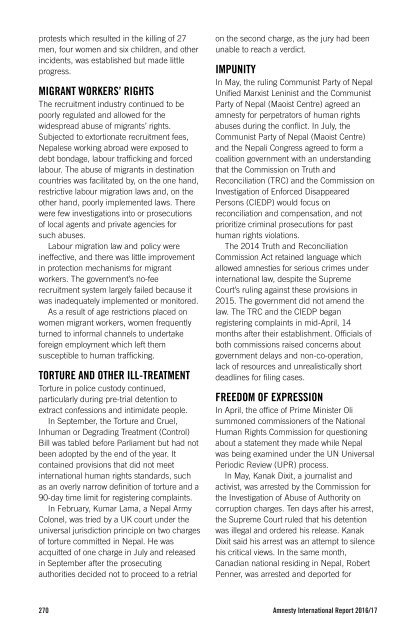AMNESTY INTERNATIONAL REPORT 2016/17
2lEHU9j
2lEHU9j
Create successful ePaper yourself
Turn your PDF publications into a flip-book with our unique Google optimized e-Paper software.
protests which resulted in the killing of 27<br />
men, four women and six children, and other<br />
incidents, was established but made little<br />
progress.<br />
MIGRANT WORKERS’ RIGHTS<br />
The recruitment industry continued to be<br />
poorly regulated and allowed for the<br />
widespread abuse of migrants’ rights.<br />
Subjected to extortionate recruitment fees,<br />
Nepalese working abroad were exposed to<br />
debt bondage, labour trafficking and forced<br />
labour. The abuse of migrants in destination<br />
countries was facilitated by, on the one hand,<br />
restrictive labour migration laws and, on the<br />
other hand, poorly implemented laws. There<br />
were few investigations into or prosecutions<br />
of local agents and private agencies for<br />
such abuses.<br />
Labour migration law and policy were<br />
ineffective, and there was little improvement<br />
in protection mechanisms for migrant<br />
workers. The government’s no-fee<br />
recruitment system largely failed because it<br />
was inadequately implemented or monitored.<br />
As a result of age restrictions placed on<br />
women migrant workers, women frequently<br />
turned to informal channels to undertake<br />
foreign employment which left them<br />
susceptible to human trafficking.<br />
TORTURE AND OTHER ILL-TREATMENT<br />
Torture in police custody continued,<br />
particularly during pre-trial detention to<br />
extract confessions and intimidate people.<br />
In September, the Torture and Cruel,<br />
Inhuman or Degrading Treatment (Control)<br />
Bill was tabled before Parliament but had not<br />
been adopted by the end of the year. It<br />
contained provisions that did not meet<br />
international human rights standards, such<br />
as an overly narrow definition of torture and a<br />
90-day time limit for registering complaints.<br />
In February, Kumar Lama, a Nepal Army<br />
Colonel, was tried by a UK court under the<br />
universal jurisdiction principle on two charges<br />
of torture committed in Nepal. He was<br />
acquitted of one charge in July and released<br />
in September after the prosecuting<br />
authorities decided not to proceed to a retrial<br />
on the second charge, as the jury had been<br />
unable to reach a verdict.<br />
IMPUNITY<br />
In May, the ruling Communist Party of Nepal<br />
Unified Marxist Leninist and the Communist<br />
Party of Nepal (Maoist Centre) agreed an<br />
amnesty for perpetrators of human rights<br />
abuses during the conflict. In July, the<br />
Communist Party of Nepal (Maoist Centre)<br />
and the Nepali Congress agreed to form a<br />
coalition government with an understanding<br />
that the Commission on Truth and<br />
Reconciliation (TRC) and the Commission on<br />
Investigation of Enforced Disappeared<br />
Persons (CIEDP) would focus on<br />
reconciliation and compensation, and not<br />
prioritize criminal prosecutions for past<br />
human rights violations.<br />
The 2014 Truth and Reconciliation<br />
Commission Act retained language which<br />
allowed amnesties for serious crimes under<br />
international law, despite the Supreme<br />
Court’s ruling against these provisions in<br />
2015. The government did not amend the<br />
law. The TRC and the CIEDP began<br />
registering complaints in mid-April, 14<br />
months after their establishment. Officials of<br />
both commissions raised concerns about<br />
government delays and non-co-operation,<br />
lack of resources and unrealistically short<br />
deadlines for filing cases.<br />
FREEDOM OF EXPRESSION<br />
In April, the office of Prime Minister Oli<br />
summoned commissioners of the National<br />
Human Rights Commission for questioning<br />
about a statement they made while Nepal<br />
was being examined under the UN Universal<br />
Periodic Review (UPR) process.<br />
In May, Kanak Dixit, a journalist and<br />
activist, was arrested by the Commission for<br />
the Investigation of Abuse of Authority on<br />
corruption charges. Ten days after his arrest,<br />
the Supreme Court ruled that his detention<br />
was illegal and ordered his release. Kanak<br />
Dixit said his arrest was an attempt to silence<br />
his critical views. In the same month,<br />
Canadian national residing in Nepal, Robert<br />
Penner, was arrested and deported for<br />
270 Amnesty International Report <strong>2016</strong>/<strong>17</strong>


